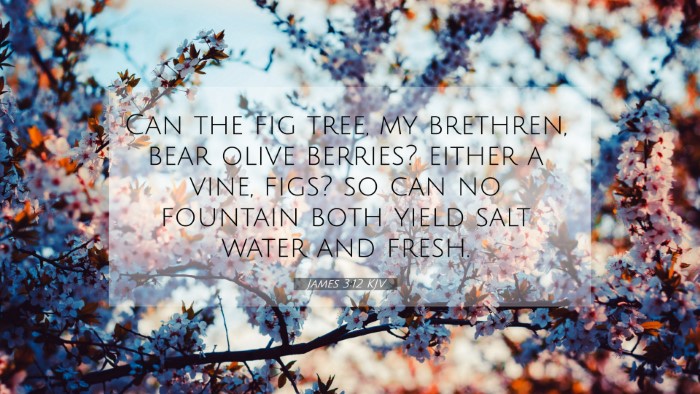Old Testament
Genesis Exodus Leviticus Numbers Deuteronomy Joshua Judges Ruth 1 Samuel 2 Samuel 1 Kings 2 Kings 1 Chronicles 2 Chronicles Ezra Nehemiah Esther Job Psalms Proverbs Ecclesiastes Song of Solomon Isaiah Jeremiah Lamentations Ezekiel Daniel Hosea Joel Amos Obadiah Jonah Micah Nahum Habakkuk Zephaniah Haggai Zechariah MalachiJames 3:12 Similar Verses
James 3:12 Cross References
Can the fig tree, my brethren, bear olive berries? either a vine, figs? so can no fountain both yield salt water and fresh.
Uncover the Rich Themes and Topics of This Bible Verse
Listed below are the Bible themes associated with James 3:12. We invite you to explore each theme to gain deeper insights into the Scriptures.
James 3:12 Cross Reference Verses
This section features a detailed cross-reference designed to enrich your understanding of the Scriptures. Below, you will find carefully selected verses that echo the themes and teachings related to James 3:12 KJV. Click on any image to explore detailed analyses of related Bible verses and uncover deeper theological insights.
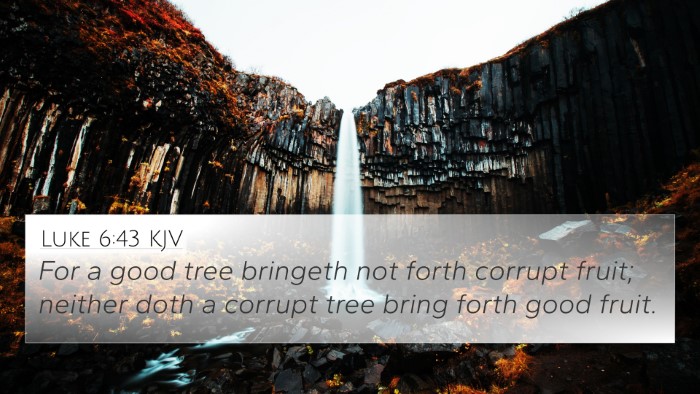
Luke 6:43 (KJV) »
For a good tree bringeth not forth corrupt fruit; neither doth a corrupt tree bring forth good fruit.

Matthew 7:16 (KJV) »
Ye shall know them by their fruits. Do men gather grapes of thorns, or figs of thistles?
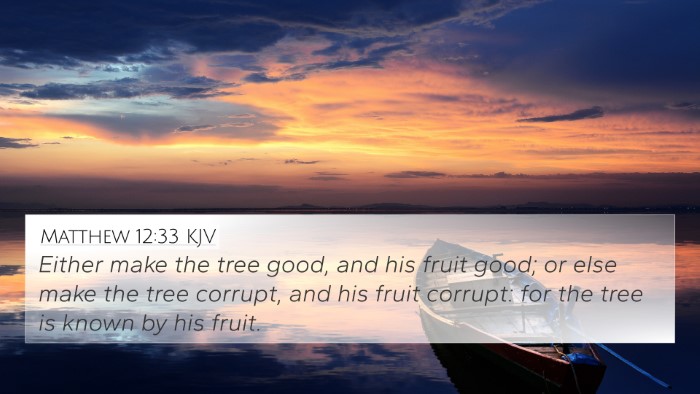
Matthew 12:33 (KJV) »
Either make the tree good, and his fruit good; or else make the tree corrupt, and his fruit corrupt: for the tree is known by his fruit.

Romans 11:16 (KJV) »
For if the firstfruit be holy, the lump is also holy: and if the root be holy, so are the branches.
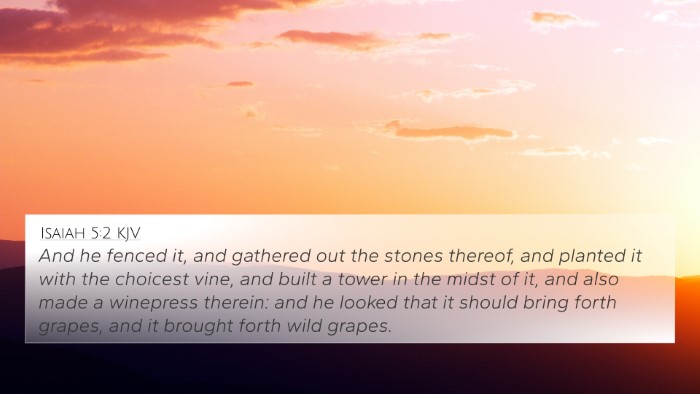
Isaiah 5:2 (KJV) »
And he fenced it, and gathered out the stones thereof, and planted it with the choicest vine, and built a tower in the midst of it, and also made a winepress therein: and he looked that it should bring forth grapes, and it brought forth wild grapes.

Jeremiah 2:21 (KJV) »
Yet I had planted thee a noble vine, wholly a right seed: how then art thou turned into the degenerate plant of a strange vine unto me?
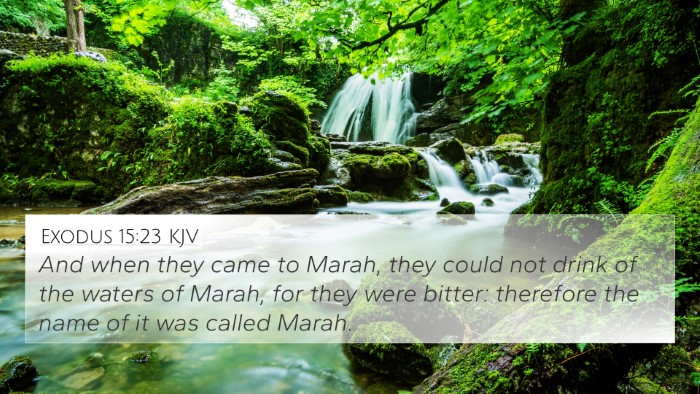
Exodus 15:23 (KJV) »
And when they came to Marah, they could not drink of the waters of Marah, for they were bitter: therefore the name of it was called Marah.

2 Kings 2:19 (KJV) »
And the men of the city said unto Elisha, Behold, I pray thee, the situation of this city is pleasant, as my lord seeth: but the water is naught, and the ground barren.

Ezekiel 47:8 (KJV) »
Then said he unto me, These waters issue out toward the east country, and go down into the desert, and go into the sea: which being brought forth into the sea, the waters shall be healed.
James 3:12 Verse Analysis and Similar Verses
Understanding James 3:12
James 3:12 states: “Can the fig tree, my brethren, bear olive berries? either a vine, figs? so can no fountain both yield salt water and fresh.” This verse emphasizes the principle that the nature of a tree is revealed by the kind of fruit it produces. It serves as an illustration of the broader concept of consistency in character and speech.
Summary of the Verse Meaning
This verse serves as a reminder of the importance of maintaining integrity in one's speech and actions. It indicates that just as a fig tree cannot produce olives, so a person cannot consistently produce both wholesome (fresh) and corrupt (salt) words. This principle can be interpreted as a call for believers to reflect on the nature of their own speech and behavior, aligning them with their Christian faith.
Commentary Insights
-
Matthew Henry: Henry elaborates that the analogy between the fig tree and the fountain illustrates the impossibility of living a double life. The source of a person’s words reveals their true character. Just as a fig tree produces figs and not olives, a believer’s speech should reflect their faith and commitment to Christ.
-
Albert Barnes: Barnes notes that this verse emphasizes the necessity of coherence in the life of a Christian. He argues that true piety is shown not only in outward behavior but also in the way one communicates. The duality of offering both salt water and fresh water is not only impractical but impossible, much like how a true believer cannot demonstrate both righteousness and wickedness.
-
Adam Clarke: Clarke points out the cultural significance of the fig tree and the vine in biblical times. He explains that the metaphor aligns with the Jewish understanding of good and bad fruit, illustrating the expected behavior of someone who claims to follow the teachings of Jesus.
Bible Cross-References
This verse can be connected thematically and textually with the following Bible verses:
- Matthew 7:16-20: “Ye shall know them by their fruits…” - This passage emphasizes the importance of recognizing genuine character through actions.
- Romans 6:21-23: Discusses the fruit of sin versus the fruit of righteousness, highlighting the consequences of one's choices.
- Galatians 5:22-23: Lists the fruit of the Spirit, providing a contrast to corrupt fruit and encouraging believers to reflect these characteristics.
- Luke 6:43-45: Echoes the sentiment that the quality of one's words reveals the state of one’s heart.
- Proverbs 4:23: “Keep your heart with all diligence; for out of it are the issues of life.” - Indicates that inner character produces outward behavior.
- Proverbs 18:21: Highlights the power of the tongue, stating that it can bring life or death.
- Ephesians 4:29: Encourages believers to speak words that are uplifting and beneficial, reinforcing the need for consistent, wholesome speech.
Connections Between Bible Verses
Exploring the connections between James 3:12 and the referenced scriptures helps deepen our understanding of scriptural themes:
- Thematic links between words and character are consistent throughout the Bible, showcasing that one's speech is a window to the soul.
- Patterns of consistently producing good or bad fruit can be traced from Old Testament teachings through the New Testament, revealing continuity in God’s Word.
- Cross-referencing James 3:12 with verses related to moral conduct illustrates the comprehensive call to holiness expected of believers.
Practical Application
For readers seeking to apply the insights from James 3:12, several practical steps can be taken:
- Engage in self-examination of your speech and behavior to ensure they align with your faith.
- Utilize Bible concordances and cross-reference guides to explore themes and connections within scripture effectively.
- Participate in cross-reference Bible study methods to uncover deeper meanings and enrich your understanding.
Conclusion
James 3:12 masterfully conveys the fundamental biblical truth that one's speech reflects their spiritual health. By examining scriptural parallels and cross-references, believers are encouraged to cultivate a life that produces good fruit, thereby demonstrating their faith authentically.


